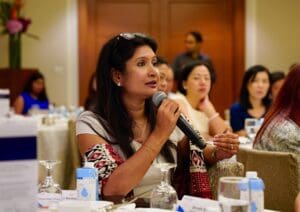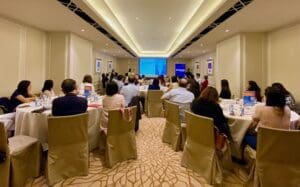

Sustainability.
You can hardly open a web browser without reading something about sustainability. Most of the time, the content is about conserving and protecting natural resources.
That’s important, but it’s only part of the picture.
Sustainability folks fill in the rest of the picture by talking about three pillars:
- Profit
- People

Cher Whee Sim, Vice President, Global Talent Acquisition and Talent Mobility, Micron. Keynote Speaker. - Planet
The pillars are interdependent. Each one needs the others.
People Sustainability
People sustainability requires supporting people and their potential to improve resilience, agility, and business impact.
Modern HR leaders create a sustainable workforce in several ways, including:
- DEI
- Health and safety
- Continuous learning
- Supporting technology
People Sustainability Event
Another way modern HR leaders are improving people sustainability is by having events to promote and educate others in the industry.
Recently, Rizing partnered with PeopleMatters to bring together leading voices to discuss:
- What are the top shifts that are changing talent priorities?
- How should HR think about redesigning processes and systems?
- How is the rise in AI and automation transforming work life?
- What is the emerging outlook that businesses need to be ready for?
Talent Deficit a Critical Focus Area
Cher Whee Sim, Vice President, Global Talent Acquisition and Talent Mobility at Micron delivered the event’s keynote.
Sim spoke about the highly competitive job market due to the “great resignation” and “great reshuffle.” She said that by 2030, the talent deficit will be 85.2 million workers globally, increasing dependency on highly skilled, diverse talent. Talent has become a critical focus area for the board and executive, with a shift towards talent strategy and risk.

- Talent sustainability (including strategy and risk)
- Corporate purpose and ESG matters
- Human capital and workforce challenges
- Shareholder engagement and activism
- Crisis management
- Board management relationship
- Board culture
Addressing the Deficit
Sim outlined how Micron focuses on growing and staffing early and mid-career talent pipelines through STEM, staffing partnerships, and learning festivals.
The rise of automation is causing a transformational shift in skills, with a shift towards higher cognitive, social, emotional, and technological tasks.
New skills are growing at an unprecedented rate of 20-30% every 12 months. It’s important to understand how T-shaped skills are being transformed in the face of increased automation, as employers highly value them.
People Sustainability Discussion
Jonathan Stewart, Global Head of TA, Enabling Functions & Regional Director TA, Insights APAC, Kantar led a post-keynote discussion.

The group highlighted the demographic shift underway in Singapore and Malaysia, where companies needed to address the needs of new retirees. Leaders also emphasized the importance of mental health and STEM education for girls.
The sustainability of initiatives can only be seen in the long term, and leaders felt HR should facilitate business conversations even if they don’t have all the answers.
Rizing’s Take
“Cher Whee Sim brought a fresh perspective and suggested new ideas for how companies can use a people sustainability strategy to build a resilient workforce and retain top talent.” says Robert Limasal, Rizing Director of Business Development. “We’re excited to continue fostering these conversations and collaborations.”
Improve Your People Sustainability
Interested in learning how partnering with Rizing can improve your organization’s people sustainability? Get in touch to get the process started!


